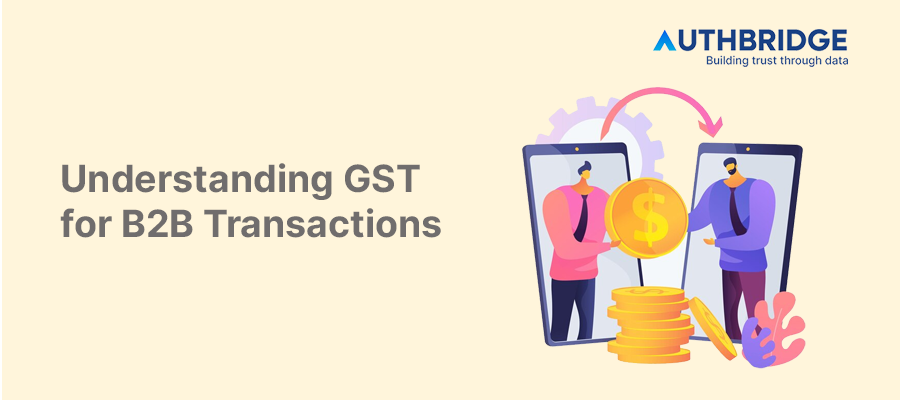Demystifying B2B Transactions Under GST: A Guide To ITC, Invoicing & Compliance

The Role of GST in Business Transactions
The introduction of the Goods and Services Tax (GST) has been a landmark reform in the Indian tax system, aiming to unify the country's diverse tax structure into a single, comprehensive framework. This change has significantly impacted how business transactions, especially those between businesses (B2B), are conducted and taxed in India.
B2B Transactions Under the GST Framework
B2B transactions refer to the sale of goods or services from one business to another. Under GST, these transactions have specific requirements and benefits, such as the eligibility for Input Tax Credit (ITC), which directly impacts the cost-effectiveness and operational efficiency of businesses engaged in B2B trade.
Key Features of GST for B2B Transactions
Mandatory GST Registration for Businesses
All businesses engaged in B2B transactions are required to register under GST if their turnover exceeds the prescribed threshold. This registration is crucial for compliance and to avail of the benefits under the GST regime.
- Table 1: GST Registration Threshold
Type of Business | Threshold for GST Registration |
Goods | Rs. 40 Lakhs |
Services | Rs. 20 Lakhs |
Input Tax Credit (ITC) Mechanism
A pivotal feature of GST for B2B transactions is the Input Tax Credit (ITC) mechanism, allowing businesses to reduce their tax liability by claiming credit for the tax paid on inputs used in the production or delivery of services.
GST Registration for B2B Transactions
Criteria for GST Registration in B2B Context
Businesses involved in B2B transactions must assess their need for GST registration based on turnover, the nature of transactions, and interstate supply considerations.
Process and Documentation Required
The GST registration process involves submitting an online application along with necessary documents, such as PAN, proof of business registration, and bank account details.
Input Tax Credit in B2B Transactions
Eligibility for Claiming ITC
Businesses can claim ITC for GST paid on goods and services used for business purposes, subject to fulfilling specific conditions and documentation requirements.
Documentation and Compliance for ITC Claims
Maintaining accurate records and invoices is essential for claiming ITC. Businesses must ensure that their purchases are from GST-registered suppliers and that they comply with all filing requirements.
Invoicing Requirements for B2B Transactions
Details to be Included in B2B Invoices
B2B invoices must include detailed information, such as GSTIN of the supplier and recipient, HSN/SAC codes, tax rates, and the taxable value of supplies.
Electronic Invoicing and Its Benefits
The introduction of electronic invoicing for certain categories of businesses has streamlined the invoicing process, ensuring better compliance and faster ITC claims.
GST Returns and Compliance for B2B Transactions
Types of GST Returns for B2B Sellers
B2B sellers are required to file multiple GST returns, including GSTR-1 for outward supplies and GSTR-3B for summarizing overall tax liability.
- Table 2: GST Return Filing Requirements
Return Type | Frequency | Description |
GSTR-1 | Monthly/Quarterly | Details of outward supplies |
GSTR-3B | Monthly | Summary of tax liability |
Reconciliation and Reporting Requirements
Reconciliation of invoices and timely reporting are critical for GST compliance in B2B transactions. Discrepancies between filed returns and actual transactions can lead to audits and penalties.
Challenges and Solutions in GST Compliance for B2B Transactions
Common Compliance Issues in B2B GST Filing
Businesses often face challenges in accurate invoice matching, timely return filing, and effective utilization of ITC.
Strategies for Effective GST Management in B2B Transactions
Adopting GST-compliant software, regular reconciliation of accounts, and staying updated with GST regulations are key strategies for managing GST compliance effectively.
Recent Developments and Their Impact on B2B GST
Changes in GST Rates or Policies Affecting B2B Transactions
The GST Council periodically reviews and updates GST rates and policies, impacting B2B transactions. Businesses must stay informed about these changes to ensure compliance.
Technological Advancements in GST Compliance
Technological solutions, such as AI and blockchain, are being explored to enhance GST compliance, making the process more efficient and transparent for B2B transactions.
Conclusion
Understanding GST for B2B transactions is crucial for businesses to navigate the complexities of tax compliance effectively. By leveraging the benefits of the GST regime, such as the ITC mechanism, and adopting best practices for compliance, businesses can ensure operational efficiency and contribute to their growth. The future of GST in the B2B sector looks promising, with continuous improvements and technological advancements aimed at simplifying compliance and fostering a conducive business environment.
Category

Abhinandan Banerjee
(Associate Manager - Marketing)
Abhinandan is a dynamic Product and Content Marketer, boasting over seven years of experience in crafting impactful marketing strategies across diverse environments. Known for his strategic insights, he propels digital growth and boosts brand visibility by transforming complex ideas into compelling content that inspires action.



